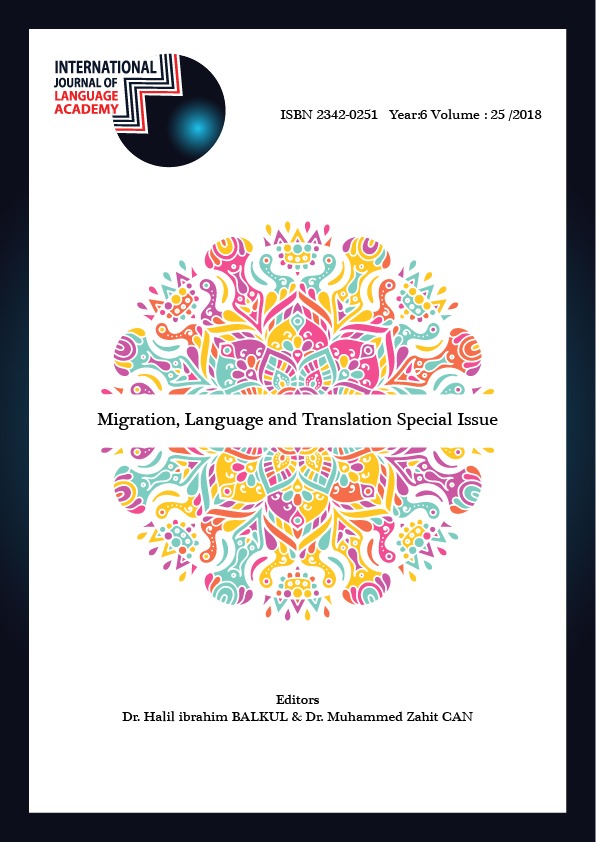Author :
Abstract
Göç, farklı bileşenleri olan ve çok boyutlu etkilere sahip bir olgudur. Tarih boyunca hemen hemen her milletin -farklı açılardan olsa bile- bu olguyla yüz yüze geldiği söylenilebilir. Nitekim Türkler de bu milletlerin arasında yer alır. Türkler göç olgusunu hem “göçmen” hem de “ev sahibi” olarak tecrübe etmiştir. Türklerin Ergenekon’la başlayan göç serüveni Anadolu’ya yerleşmekle son bulmamıştır. Hâlen ekonomik, sosyal, siyasî, coğrafî çeşitli sebeplerle bireysel veya topluluklar hâlinde farklı biçimlerde sürmektedir. Türk toprakları da benzer sebeplerle tarih boyunca başka milletlerden göç almıştır, günümüzde de almaya devam etmektedir.Göçle birlikte alışılmış yerlerin ve insanların terk edilmesi, farklı ve bilinmeyene hareket söz konusudur. Göçün maddi, manevî zorlukları beraberinde getirmesi kaçınılmazdır. Bununla birlikte göçle ilgili Türk atasözlerinin pek çoğundan kadim Türk kültüründe göç olumsuz bir durum olarak görülmediği anlaşılmaktadır. Klasik Türk edebiyatında da bu hareketliliği destekleyen ve göçün güzelliğini ortaya koyan çok sayıda beyit bulunmaktadır. Peki, 21. yüzyıl Türkiye Türklerinin göçe bakış açısı nasıldır? Bu bildirinin temel amacı bu araştırma sorusunu cevaplandırmaktır. Bu doğrultuda, bu kavrama yüklenen olumlu veya olumsuz çağrışımların tespiti amacıyla Türkiye Türkçesinde yer alan temel GÖÇ kelimelerini temsilen göç kelimesi derlem dil bilimi yöntemleriyle incelenmiştir.
Keywords
Abstract
Migration is a phenomenon with different components and multidimensional effects. It is a phenomenon that almost every nation experienced from different directions. As a matter of fact, Turks are among these nations. Turks have experienced the phenomenon of migration both as “migrant” and “landlord”. The immigration adventure of the Turks started with the Ergenekon. Currently, migration of individuals or communities persists, because of economic, social, political and geographical reasons. Turkish lands have also received immigration from other nations throughout the history for similar reasons. In the migration process, the familiar places and persons are abandoned. There is movement to different and unknown places. Material and spiritual difficulties are inevitable for migration. However, as seen in many Turkish proverbs, in ancient Turkish culture the concept of migration is not seen as negative. Also in Classical Turkish literature there are many couplets that support this mobility and reveal the beauty of migration. What about the immigration perception of Turkey Turks in 21st century? The main purpose of this paper is to answer this research question. In this respect, the word of göç is examined as sample of basic MIGRATION words in Turkey Turkish, with corpus linguistics methods.
Keywords
- Ak, M. (2014). Divan Şiirinde Taşra Kullanımı ve Divan Şiirinin Taşrası. İstem. 12(24): 85- 102.
- Aksan, Y. ve diğerleri (2012). Construction of the Turkish National Corpus (TNC). Proceedings of the Eight International Conference on Language Resources and Evaluation (LREC 2012). İstanbul. Türkiye. http://www.lrecconf.org/proceedings/lrec2012/papers.html
- Ay, G. (2010). İnsan Hayatında “Göç” Olgusu ve Halk Türkülerine Yansıması. Halk Kültüründe Göç Uluslararası Sempozyumu. 28-30 Mayıs, Balıkesir, 148-159.
- Ayverdi, S. (2008). Hey Gidi Günler Hey.(3. Baskı).İstanbul: Kubbealtı Neşriyatı
- Can, Ş. (2001). Hz. Mevlana’nın Rubaileri, Ankara: Kültür Bakanlığı Yayınları.
- Çalışkan, N. (2014). Semantik Prozodi Kavramı ve Türkçe Semantik Prozodi Örnekleri: ‘aksettirmek, ...dan ibaret, ...nin teki, karşi karşiya, varsa yoksa’. Zeitschrift Für Die Welt Der Türken / Journal Of World Of Turks. 6 (1): 139-160.
- Demir, M. (2010). Atasözü ve Deyimlerde Göç, Halk Kültüründe Göç Uluslararası Sempozyumu, 28-30 Mayıs, Balıkesir, 315-322.
- Hoey, M. (2005). Lexical Priming: A New Theory of Words and Language. Abington, Oxon: Routledge.
- Hunston, S. ve Francis, G. (1999). Pattern grammar. A corpus-driven approach to the lexical grammar of English. Amsterdam and Philadelphia: John Benjamins.
- Louw, B. (1993). Irony in the text or insincerity in the writer? The diagnostic potential of semantic prosodies. Text and technology: In honour of John Sinclair. Hazırlayanlar: Baker, M., Francis, G., Tognini- Bonelli, E., Amsterdam, Netherlands: John Benjamins, 157–175.
- Partington, A. (1998). Patterns and meanings: Using corpora for English language research and teaching. Philadelphia, PA: John Benjamins.
- Partington, A. (2004). Utterly content in each other’s company: Semantic prosody and semantic preference. International Journal of Corpus Linguistics. 9 (1), 131-56.
- Pilten, Ş. (2011). Orhon Yazıtlarında Anlam Vezni. Türk Dünyası: Geçmişi ve Bugünü Uluslararası Türkoloji Sempozyumu. 28-29 Nisan, Astana, Kazakistan.
- Pilten-Ufuk, Ş. (2017a). Zarifoğlu'nun Düşünce Dünyasında Kadın (I): İşaret Çocukları Kitabının Anlam Veznine Dayalı Tutum ve Değerlendirme Analizi. International Journal Of Turkish Literature Culture Education. 6(6/2), 964-985.
- Pilten-Ufuk, Ş. (2017b). Anlam Vezni Kavramı Üzerine Değerlendirmeler.Avrasya Terim Dergisi. Sayı 9: 1-10.
- Sinclair, J. (1996). The Search for Units of Meaning. Textus. IX. 75-106.
- Stubbs, M. (1996). Text and Corpus Linguistics. Oxford: Blackwell
- Tuzcu, A. ve Bademli, K. (2014). Göçün Psikososyal Boyutu, Psikiyatride Güncel Yaklaşımlar, 6(1):56-66.
- Yılmaz, A. ve Telci, C. (2010). Türk Kültür Terminolojisinde Göç Kavramı Üzerine.Modern Türklük Araştırmaları Dergisi. 7/2: 14-33.
- Yusuf Nabî (2003), Hayriyye. Haz. İskender Pala. İstanbul: LM Yay (2. Baskı).





